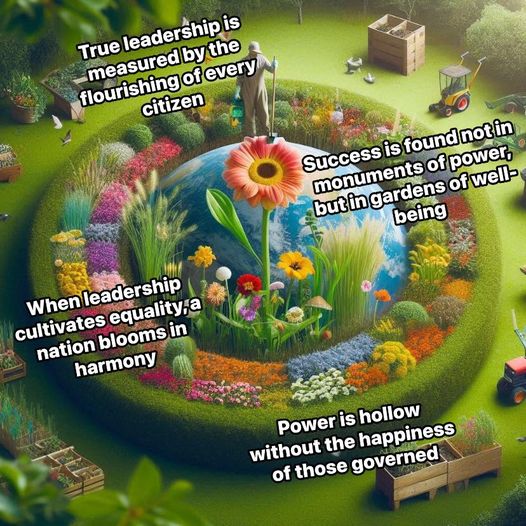
When we think of a government’s success, it’s easy to focus on the tangible symbols of power—wealth, influence, and military might. These are the towering monuments that catch the eye, like mountains rising majestically on the horizon. Yet, much like barren peaks, they offer little nourishment to the valleys below. True success in governance is not about reaching the highest heights of power, but about cultivating the well-being, happiness, and flourishing of the people. A nation’s greatness should be seen not in its ability to dominate but in its capacity to uplift.
Consider the role of a gardener. Their success isn’t judged by the size of the plot they tend, but by the vibrancy and health of the flowers that bloom under their care. So, too, should we measure a government by the vitality of its citizens. If a nation is a garden, its people are the plants that must be nurtured with attention and care, thriving together in the rich soil of equality and watered by justice. In this garden, every individual matters, and the health of the whole depends on the growth of each part.
A nation’s wealth can be compared to a grand ship—imposing and impressive in size and structure. Yet, that ship is meaningless if it fails to provide safe passage for those aboard. In the same way, a government that amasses wealth and power without ensuring the well-being of its citizens is a hollow force, adrift in shallow waters. Real leadership, like skilled navigation, involves steering toward a common good where every life on board has the opportunity to thrive.
Imagine a weaver at the loom, crafting a tapestry. Each thread is a life, each color a different experience, and each stitch a connection to the larger whole. The beauty and strength of that tapestry depend not on a single thread but on the harmony and cohesion of all threads woven together. A government, like the weaver, must ensure that every citizen is woven into the fabric of society, creating a tapestry that is both beautiful and resilient.
The analogy extends to the work of an architect. While aesthetic beauty may draw admiration, the true measure of an architect’s success is the comfort, safety, and livability of the structures they create. Similarly, a government’s legacy is not built on monuments or symbols of power, but on the foundations of equality, compassion, and shared prosperity. These are the pillars that support a nation where all can stand tall, not alone but together, thriving in harmony.
In the end, true success is not found in vaults of gold or halls of power. It resides in the hearts of the people, where joy, peace, and opportunity are allowed to take root and grow. The measure of a nation’s greatness lies not in the noise of its wealth or the clamor of its power but in the quiet contentment that spreads like a soft melody among its people. A nation is like a symphony, where every note contributes to the beauty of the whole. Only when every person’s well-being is considered, and every voice is heard, does that symphony become truly magnificent.
Governments must remember that their most valuable asset is not the wealth they hoard or the power they wield, but the happiness and harmony that blossom when people are allowed to flourish. It is in this shared joy that the strength of a society is found, and in this unity that true greatness is realized.

